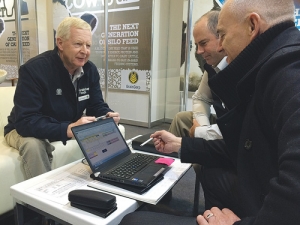Farmers warned to upgrade as 3G shutdown looms
As the clock ticks towards the 3G mobile network shutdown, farmers are being warned to upgrade or risk losing connection to their supply chain.
 A lack of reliable, fast internet connectivity can have a number of implications for rural consumers.
A lack of reliable, fast internet connectivity can have a number of implications for rural consumers.
In this digital age people want to interact on all manner of digital devices on a myriad of social media platforms all the time.
The young don't expect to wait for a response; they want it now!
But rural folk feel like we're swimming against the tide. And though some of us like it that way, for many the idea of missing out on 21st century technology is a sting that hurts.
A lack of reliable, fast internet connectivity can affect productivity, education choices, friendships and lifestyles. John Kirwan knows it and we know it: isolation is a major cause of depression and anxiety in New Zealand.
In fact, isolation is the number-two health issue in rural communities. Rural Health Alliance New Zealand (RHANZ) is running workshops for rural health professionals, industry groups and community groups in suicide risk assessment and suicide prevention strategies.
Upper Moutere film maker Keith Hawke spent a year documenting the effects of rural suicides, which he made into an independent film.
"People living on rural properties are disproportionately affected by suicidal thoughts because they tend to be isolated," he says.
The government's rural broadband (RBI) is now being installed. The new cell towers going up will make a big difference to people living and working the 6km signal zone. The second instalment (RBI2) will go much further, meanwhile other services can deal with rural isolation now.
Satellite is the ultimate communications method: no cables, no trenches, no wait for installation; you get fast, reliable internet in a matter of days.
Says Wireless Nation's technical director Tom Linn, "reliable and affordable connectivity is critical for the health and wellbeing of rural communities – especially to minimise the sense of isolation [afflicting] rural families and improving access to health services. Satellite connectivity also opens up business and economic development opportunities."
The satellite networks used by Wireless Nation have 'hot' signal strength over NZ. Its high 'look' angle makes it less prone to rain fade and line-of-sight issues and it can stand severe weather.
A recent speed test survey by TrueNet shows satellite consistently outperforming old-time copper ADSL connectivity in rural areas.
• Penny Hartill is Wireless Nation's communications advisor.
Budou are being picked now in Bridge Pā, the most intense and exciting time of the year for the Greencollar team – and the harvest of the finest eating grapes is weeks earlier than expected.
The Real Estate Institute of New Zealand (REINZ) has released its latest rural property report, providing a detailed view of New Zealand’s rural real estate market for the 12 months ending December 2025.
Rural retailer Farmlands has released it's latest round of half-year results, labeling it as evidence that its five-year strategy is delivering on financial performance and better value for members.
OPINION: "We are back to where we were a year ago," according to a leading banking analyst in the UK, referring to US president Donald Trump's latest imposition of a global 10% tariff on all exports into the US.
DairyNZ says the Government’s proposed Resource Management Act reform needs further work to ensure it delivers on its intent.
Overseas Trade Minister Todd McClay says he's working constructively with the Labour Party in the hope they will endorse the free trade agreement (FTA) with India when the agreement comes before Parliament for ratification.